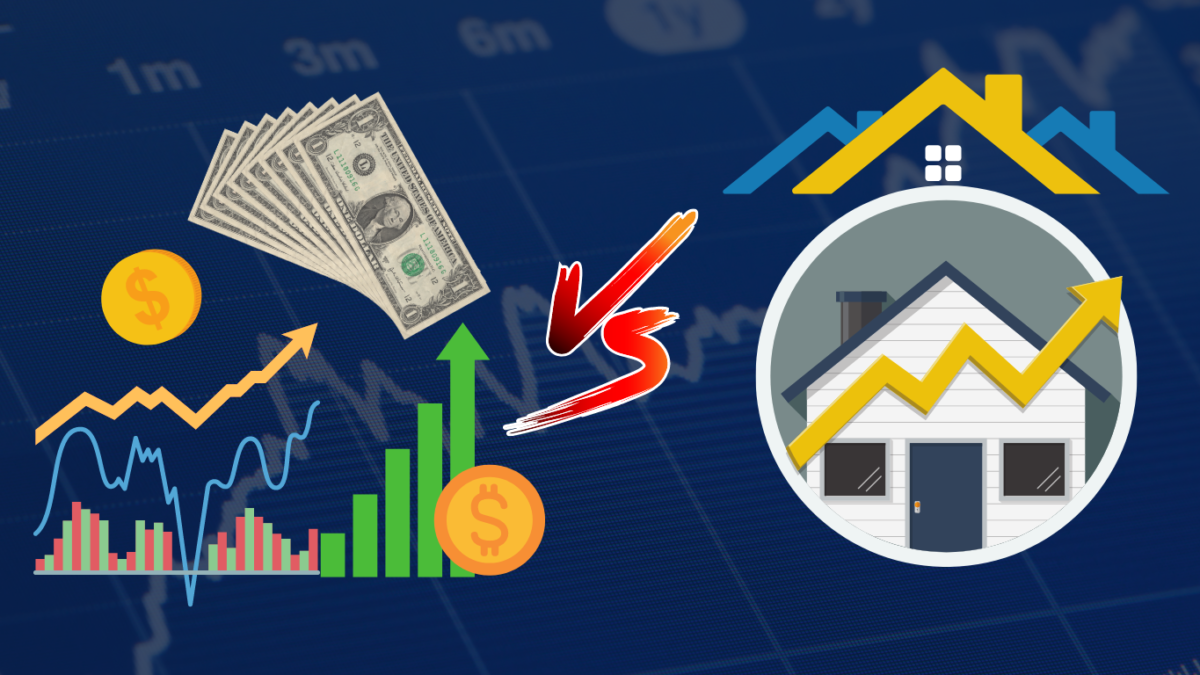Stocks vs Real Estate – What’s Better?


When “Investing” is brought up, what is the first thing that flashes in your mind?
Stocks? Great Recession? How Warren Buffett continues to grow while your portfolio is single digits, flat, or negative growth?
Unfortunately, 60 percent of Americans find investing to be scary or intimidating, according to a new independent market survey.
Alternatively, 60 percent also recognize that “someday” they will need greater financial security than what they currently have.
What happens? People put off taking any kind of action and continue to fall behind.
If you want to learn more about taking control of your investment strategy, this article will cover a few comparisons between investing in the stock market vs. investing in multifamily commercial real estate.
In addition, we’ll cover how the risks associated with the stock market can be higher than investing in real estate.
What is Risk?
All investing carries an element of risk. Just as you could have been hit by a car this morning, unexpected things come up in life, the stock market, and in real estate.
The key is not to look for investments that are risk-free (that don’t exist), but to understand the risks thoroughly, determine your threshold for risk, and ensure that you’re doing everything you can to mitigate risk.
Risk #1 – Consumer Behavior
Stock Market
Stock market investors bet on the success of companies who create products for people to use. TVs, phones, and shampoo are all consumable products.
However, it’s impossible to predict the term length of those products’ and companies’ popularity. Blockbuster video had a long reign, but when technology and consumer behavior changed, the company stagnated, dragging investors down with it.
Multifamily Real Estate Investments
When you invest in real estate, you’re investing in a basic human need that will never go away: the need for shelter. As long as humans have existed, we’ve required a roof over our heads, and that need has only strengthened over time, especially with rising population trends.
Risk #2 – The Market Could Turn
Stock Market
One of the most common fears and possibly the biggest reason would-be investors remain on the sidelines is for fear of a sudden market correction.
During a downturn, investors may exit quickly (which only solidifies their losses). Others aim to accept short-term losses in exchange for long-term gains. Historically, the market bounces back, but clinging to that “trust” is challenging during the downward trend.
Multifamily Real Estate Investments
Recessions are actually good for commercial multifamily real estate investments, especially for workforce housing.
In good times, incomes and savings rates are higher, which means more people tend to move up to class A (luxury) apartments.
When faced with layoffs or pay cuts, homeowners may sell, and renters of class A apartments may downgrade to more affordable apartments (class B or C). We saw this play out in our portfolio starting in 2009.
Hence, during a recession, demand for apartments actually tends to go up, thereby decreasing the risk.
Risk #3 – Competitors Could Come on the Market
Stock Market
When Netflix stormed the scene, they beat out Blockbuster because not only did they target the same audience, but they also got ahead of the technology and consumer trends.
Consumers don’t have insight into technology development or companies’ operations. Thus, new competitors can have a significant impact on investment returns.
Multifamily Real Estate Investments
Multifamily competitors don’t just spring up out of nowhere, because space, zoning, and permits are limited. When new apartments are built, they’re always class A (i.e. newer luxury tier) apartment buildings.
Since the demand for workforce and affordable housing is on the rise, the risk of having high vacancy in well-maintained class B and C apartment buildings is fairly low.
Risk #4 – Not Having Control and Transparency
Stock Market
Investing in stocks is like buying a train ticket. The train is leaving, with or without you. Whether you’re on board or not is up to you.
When the market is sailing upward, the ride is smooth and exciting. During a correction, a terrible, helpless feeling takes over. The conductor (CEO) is unreachable and you better buckle up.
Multifamily Real Estate Investments
When you invest in a real estate syndication, you know exactly who the deal sponsor is, and you can reach out directly to ask questions and provide feedback.
Further, when you invest in a solid syndication, you can be assured that there are multiple buffers in place to protect investor capital, such as reserves, insurance, and experienced professionals to handle the unexpected.
Plus, with monthly and quarterly updates, you have ongoing transparency into each deal.
Conclusion
There’s certainly not one right way to invest.
The key is to invest.
Understand the risks going in, and just do it. Because that money you see sitting in your savings account? It’s losing value (because of inflation) with every passing second.
Get out there, and start achieving your “someday” today.
Related posts
Understanding the Distinction Between Asset Management and Property Management in Multifamily Real Estate
Read more
Changes In the Bonus Depreciation Rules and How It Impacts Real Estate Investments
Read more


